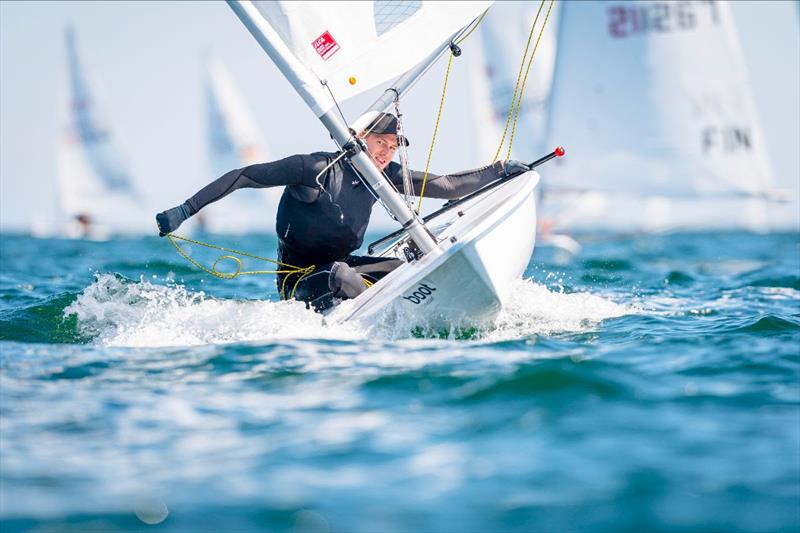
Glenn Reitinger on the 2022 ILCA U.S. National Championships
by David Schmidt 12 Jul 2022 16:00 BST
July 14-17, 2022

First-class boat handling by overall leader Nik Aaron Willim on the ILCA 7 during Kiel Week © Sascha Klahn / Kieler Woche
When it comes to hyper competitive and affordable One Design classes, it's hard to beat the ILCA dinghy and its three different rigs. Sailors who have been around the racecourse a few times might better recognize "ILCA 7s" as "Lasers", "ILCA 6s" as "Laser Radials", and "ILCA 4s" as "Laser 4.7s", but that's a different chapter in the class's rich history. Names aside, the linesplan that Bruce Kirby sketched on a napkin in 1969 continues to be an international sailing phenomenon that attracts some of the world's best One Design sailors and offers fantastic on-the-water competition.
Take, for example, this year's ILCA U.S. National Championships (July 14-17), which are being hosted by the Brant Beach Sailing Foundation and the Brant Beach Yacht Club, on the waters off of Brant Beach, New Jersey.
I checked in with Glenn Reitinger, co-chair of the 2022 ILCA U.S. National Championship, via email, to learn more about this exciting One Design regatta.
Can you please tell us a bit about the current state of the ILCA class, its culture and competition levels, and the kinds of sailors that one can expect to encounter at this year's North Americans?
The class has remained strong and continues to grow, particularly with younger sailors. This is evidenced by over 80% of the current registrants are in the ILCA 6 and 4 divisions.
A rose by any other name is still smells as sweet, of course, but have you seen any cultural shifts/changes in the class since it changed its moniker from the Laser to the ILCA?
We have not seen any "cultural shifts" with the name changes.
It's good to see new multiple builders.
The most difficult item is modifying the vernacular Standard/Full to ILCA 7, Radial to ILCA 6 and 4.7 to ILCA 4.
What kind of entry numbers are you seeing this year? Also, are there any notable geographical concentrations to this entry list?
As of 30 June, we have 234 entrants and 13 coaches signed up.
Two thirds are ILCA 6 sailors.
Geographically, many sailors are from the East Coast and Canada. Outside of North America we will have sailors from over five other countries.
Weather-wise, what kind conditions can sailors expect to encounter off on Brant Beach in mid-to-late July? What are the best-case and worst-case weather scenarios?
Our island is located several miles offshore and is subject to a coastal sea breeze.
Our winds are generally moderate with lighter breezes in the morning freshening to a brisk (15-20 [knots]) breeze in the afternoon. That's the best case. The worst case is an up and down oscillating westerly.
Do you see local knowledge playing a big or small role in the regatta's outcome? Can you please explain?
Having hosted the Nationals and North Americans numerous times over the past two decades, sailors from across the North American continent have won or scored podium finishes. Our racecourse is in the middle of an unobstructed bay with a relatively uniform depth where the shifts oscillate across the course and the current is also uniform across the course.
If you could offer one piece of advice to visiting (and local) sailors, what would it be?
We do occasionally (sometimes more than others) have floating eel grass, so competitors need to be aware and keep their daggerboards and rudders clear.
Do you have any entries that you're eyeing for podium finishes? What about any dark horses who you think could prove to be fast, once the starting guns begin sounding?
Right now, Clay Johnson (who won the ILCA 7 Nationals in 2015) is a leading candidate.
Some local sailors like Peter Hurley, Andrew Puopolo, Michael Ehnot, Michael Russom, Eric Reitinger and Glen Dickson are a few dark horses.
David Shanker, [who is] the president of the Brant Beach Sailing Foundation and immediate past commodore of the Brant Beach Yacht Club, and who sailed in the very first Laser Nationals in 1972 is a REALLY dark horse.
Can you tell us about any efforts that you and the other regatta organizers have made to try to lower the regatta's environmental footprint or otherwise green-up the regatta?
We've been taking steps over the last several years to lower our footprint.
These are just some examples: not printing Sis; providing two boatyard-filtered water fill stations and one on the ground floor of our new South Harbor Facility; making sure all our RC and support boats will be able to receive trash and recyclables from competitors between races; using biodegradable cups for post-race refreshments, and using either reusable or biodegradable plates, cups and utensils for our dinner and breakfasts.
With $5.50-plus fuel prices all chase/media/race-committee boats will do everything they can to burn less fuel.
Is there anything else that you'd like to add, for the record?
The Brant Beach Yacht Club and Brant Beach Sailing Foundation have worked hard over the past two decades to host major regattas for shallow-draft One Design classes.
Our venue is perfectly suited for large numbers of dolly launched boats.
Our RC Team is made up of individuals who grew up racing One Design sailboats, and if you looked at just six RC members you would find 300-plus years of racing and RC experience.
Our ashore team, which is similarly experienced, works hard to welcome arriving sailors, [showing them to] their boatyard storage locations, and to provide meals and refreshments.
We look forward to having a safe, fun and competitive regatta.